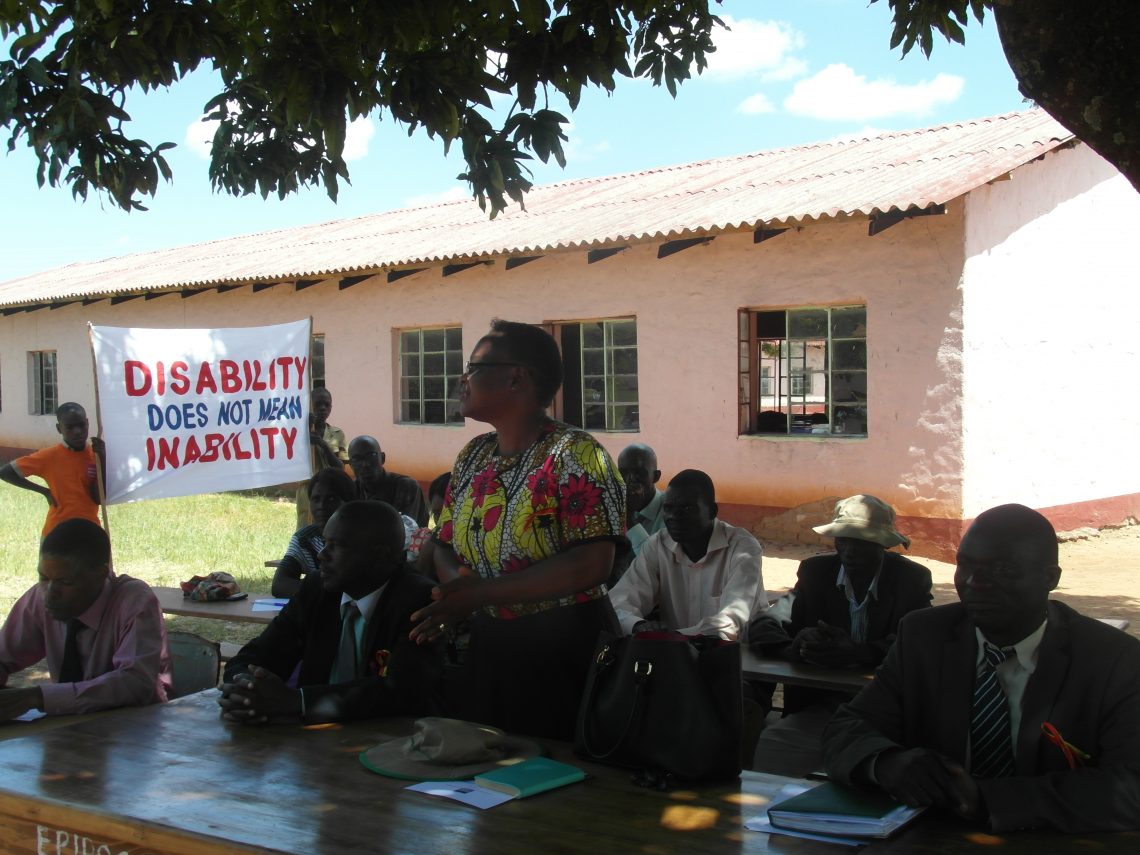By Byron Mutingwende
“In the past, a child born with disability was considered as a curse to the family and the community. Disability is a result of many factors including accidents, diseases or hereditary. In worse scenarios, parents of children with disabilities were ashamed of even sending their children to school.
“With appropriate education and advocacy, people are now enlightened and schools are being made inclusive to accommodate pupils with disabilities and as the traditional leadership we are happy about such developments,” said Chief Mutizwa Nherera of Mhondoro District in the Mashonaland West Province of Zimbabwe.
Chief Nherera made the remarks on 21 March 2018 during the “Ring a Bell Campaign” spearheaded by the Liliane Foundation in partnership with Leonard Cheshire Disability Zimbabwe (LCDZ) at St. John’s Primary School in his area.
According to findings by the Liliane Foundation 2018 Manifesto, nine out of 10 children with disability are not welcome in school.
“Countries have mutually agreed that it should be possible for all children to go to school no matter what. So this includes children with a disability. But precisely this vulnerable group is commonly left behind at home. And if we don’t act, will also be left behind in life. We are sounding the alarm bell, and say: All children are welcome to school, including children with a disability,” reads a manifesto sent out worldwide to put the issue of giving access of education to children with disabilities on the international political agenda.
It is high time that ‘accessible education’ becomes a reality in all nations. All children with a disability must feel really welcome at school. Wherever they are in the world.
At St. John’s, 63 parents and guardians signed the manifesto to show their support to the idea of giving children with disabilities access to education. The manifesto focuses on 10 urgent points.
All children want to be able to reach school. There is need to provide children with a disability (adapted) transport to school. All children want to be able to enter and pass through the school hence the need to make school buildings, furniture and grounds accessible for children with a disability.
Thirdly children want to be able to visit the restroom. Schools should provide an adapted restroom at every school for children with a disability.
All children want to receive ‘honest’ education hence the need to adapt lessons and rules for children with a disability.
“All children want to play. Allow children with a disability to participate in sports and games at school. All children want friends. Teach children how they can be there for children with a disability. All children want parents to help. Stand up as parents for children with a disability. All children want good guidance. Train teachers how they can better council children with a disability. All children want positive attention. Children with a disability have the right to go to school. All children want to just be a kid. Let children with a disability advance and enjoy.”
LCDZ runs the Child Empowerment Programme, whose programme officer, Turkson Zimbudzana said the initiative is helping some children with disabilities in Mhondoro through payment of physiotherapy fees, uniforms and school fees for these children with disabilities to access education.
“This programme provides assistance to children with disabilities from the ages of 0-25 years. The “Ring the Bell’ is an awareness campaign for the education of children with disabilities (CWD. The one minute campaign code named ‘We Ring the Bell’ aims to raise awareness among policy makers, communities and school children among others on the right of CWD to education,” Zimbudzana said.
During the campaign, children at St John’s Matarutse Primary school marched and rang bells to draw the attention of the responsible authorities and communities to the fact that their peers with a disability are not able to or not allowed to attend school. They rang bells and beat drums and pots among other noise making instruments.
Evangelista Mariga, the Chegutu District Remedial Tutor who was the Guest of Honour at the event said the ministry was running a number of initiatives that advance inclusive education.
“We are promoting the building of infrastructure like ramps and also introducing special education like sign language in the mainstream schools. Examinations are the same for all children but only modified to meet the special needs of children with disabilities,” Mariga said.
In the same vein, sign language interpreters are now seconded to schools as well as assistive devices like the Braille for the visually impaired. All teacher training schools have a compnent of special needs education.
Marufu Mawere, the Headmaster of St. John’s Primary School called on parents in the Mhondoro area to come in the open as early as they identify that their children have disabilities so as to get support from organisations like LCDZ at an early stage.
“Parents and guardians should be quick to declare children with disabilities so that organisations like LCDZ can give support like physiotherapy and school fees payment to promote inclusive education,” Mawere said.






